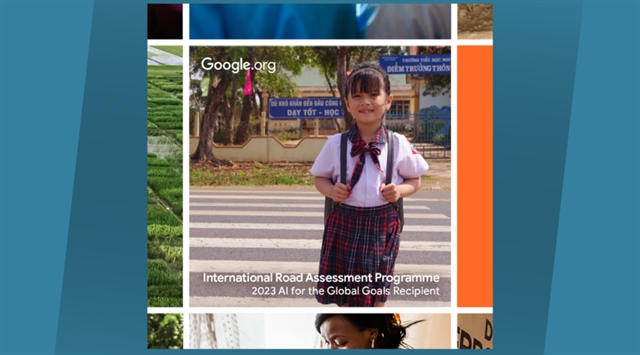 Society
Society

 |
| International Road Assessment Programme is receiving USD$2 million in grant funding and additional support from Google’s philanthropic arm, Google.org to provide children with a safer journey to school. |
LONDON — The International Road Assessment Programme (iRAP) is receiving USD$2 million in grant funding and additional support from Google’s philanthropic arm, Google.org, to provide children with a safer journey to school across the world, including Việt Nam.
Road traffic crashes are the leading cause of death among children and young people worldwide. Over 100,000 people are killed or suffer life-changing injuries on the world’s roads every day. To address this issue the UN Sustainable Development Goal 3.6 strives to halve road deaths and injuries by 2030 and Member States have agreed on voluntary targets to improve road infrastructure safety to the iRAP 3-star or better global standard.
“The AI enabled Star Rating for Schools partnership with Google.org is a global game-changer that will support sustainable mobility for youth and contribute to at least eight of the UN Global Goals,” iRAP CEO, Rob McInerney said. “We know that children are approximately 20 times more likely to be killed or injured on a 1-star road compared to a 5-star road. By using artificial intelligence to identify high-risk 1- and 2-star roads that children use on their journey to school we can identify known hazards and mobilise evidence-based upgrades that will save children’s lives.”
Using AI, satellite imagery and Street-View images to detect road safety risks, iRAP, together with partners AIP Foundation, Anditi and the University of Zagreb (FPZ, FER), will provide a country-wide star rating evaluation of road infrastructure around schools in Việt Nam and support the upgrades at the highest-risk schools. The YEA Youth Engagement App will also be used to capture student perceptions of the risks they face to inform decision- making.
“Road safety is not only an under-represented public health crisis, it also impacts peoples’ ability to access education, health, well-being and job opportunities,” says James Bradford, iRAP’s Global Technical Director. “With AI and big data, we maximise the effectiveness and efficiency of the Star Rating process to allow governments to save time and resources.”
As a charity, iRAP’s vision is for a world free of high-risk roads for all road users. Through iRAP’s global Star Rating for Schools and AiRAP partnerships the project has the potential to scale to other countries and inform new policies and investment in pedestrian-friendly roads that will minimize preventable harm.
“Our ultimate dream is to Star Rate every road on earth and ensure every journey is safer. Achieving the UN target for more than 75 per cent of travel on 3-star or better roads will help save over 100 million deaths and injuries over the life of the upgrades. The Google.org partnership is a big safe step in that direction,” Mr McInerney said.
Google.org’s AI for the Global Goals Impact Challenge is part of Google’s company-wide commitment to help accelerate progress towards the UN’s Sustainable Development Goals. iRAP is one of 15 organisations receiving support through the $25 million philanthropy challenge for projects that use artificial intelligence (AI) to accelerate progress towards these goals. Out of many submitted proposals, 15 were selected for funding. Importantly, all of the projects will be open-sourced, so other organisations can build upon the work.
“Each of the 15 selected organizations share our vision for using AI to accelerate progress on the United Nations’ Sustainable Development Goals, and each organisation brings their own expertise to help move the needle,” said James Manyika, Google’s SVP of Research, Technology and Society. “We are inspired by the possibilities they see for how AI can be harnessed to help people solve societal problems, and are excited about the collective impact they will have over the next three years.” — VNS




